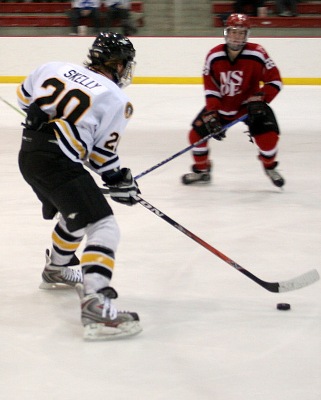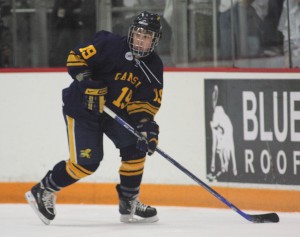And then there were two.
The eight teams in the ECAC Northeast have been whittled down to Curry and Johnson & Wales, who will meet for the conference championship and an automatic berth in the NCAA tournament Saturday at 4:35 p.m. EST.
But the two remaining teams are missing a number one.
Top seeded Wentworth is missing from the final thanks to an upset at the hands of sixth seeded Johnson & Wales (12-14-1 overall, 7-6-1 in the ECAC Northeast) Wednesday night. After knocking off third seeded Suffolk in the quarterfinals, the Wildcats used four second period goals, including two from Trevor Jewell, to shock the Leopards on their home ice, setting up a matchup with the Colonels in the final.
Curry (18-8-1, 10-3-1), meanwhile, took care of business against Western New England and Becker to reach the championship match.
“Johnson & Wales has a lot of firepower. They’ve got some good players,” said Western New England head coach Greg Heffernan, whose team played each squad twice in the regular season. “Johnson & Wales isn’t that much of an underdog. It shows the parity in the league.”
Craig Houle (18 goals, 27 assists, 45 points), Jason Pietrasiak (24-15-39) and Jeremiah Ketts (10-25-35) have each posted eye-popping point totals thus far for the Wildcats.
“Pietrasiak can put up three or four points against anybody,” Heffernan said. “If he and his linemates step up and come to play, it could the difference between two and four goals.”
Heffernan pointed to Curry’s depth, which starts in net where the trio of Robert Dawson, Zachary Cardella, and Steven Jakiel have almost evenly split the minutes in conference play and combined to post a 2.20 goals against average in ECAC Northeast games.
The Colonel’s offensive depth is also impressive, with six players over the 20 point plateau.
“[Curry head coach] Rob [Davies] uses a hybrid system similar to Middlebury where they shoot a guy through the middle on the rush. But I’m sure [Johnson & Wale’s] Eric Noack is a smart enough coach to counter that,” Heffernan said.
The two teams split the season series, with Curry taking the first game 3-2 before the Wildcats emerged with a 5-3 win on February 18.
“The pressure is on Curry because they are perceived to be a better team,” Heffernan said. “Johnson & Wales goes up with no pressure. I think its going to come down to goaltending and who generates chances through hard work.
“If I were coaching, I’d think four goals would be enough. The losing team will score three goals or less. It’s going to be a hell of a hockey game.”
Speeding through the MASCAC
The MASCAC wrapped up regular season play Sunday and will hold the conference championship Saturday. Fitchburg State, which used a 10 game winning streak to grab first place for good a month ago, won the regular season title with a 14-4 record, two points ahead of Salem State
It marks the first regular season title for Fitchburg since the 1998-99 season.
The Falcons and Vikings each received a first round bye and will host six seed University of Massachusetts-Dartmouth and third seed Plymouth State, respectively, on Thursday night. No. 5 UMass-Dartmouth pulled of an upset of its own in the conference quarterfinals Tuesday, taking down fourth seeded Westfield State with a flurry of first period goals en route to a 4-3 win. Plymouth State easily handled seventh seeded Worcester State, 7-3, to advance to the semifinals.
The championship game will be held Saturday at the highest remaining seed at a time to be determined. No automatic bid to the NCAA tournament will be at stake, as the MASCAC will not be eligible for the tournament for another two years.
Weekly and Yearly Honors
ECAC Northeast
Wentworth forward Skylur Jameson was selected as the ECAC Northeast Player of the Year in a vote by the league’s head coaches. The sophomore finished the season with eight goals and 15 assists in 14 league games, which was tops on the first place Leopards.
Suffolk netminder Jeff Rose was voted Goalie of the Year, compiling a 2.55 goals against average and .915 save percentage in conference play. Zach Kohn of Nichols received Rookie of the Year honors, finishing with 20 points on eight goals and 12 assists.
Chris Glionna was voted Coach of the Year after leading Suffolk to an 8-4-2 conference record, good for third after finishing eighth in 2000-09.
First Team All-ECAC Northeast
Forward — Craig Houle, Johnson & Wales, Junior
Forward — Jeff Olitch, Wentworth, Senior
Forward — Skylur Jameson, Wentworth, Sophomore
Defense — Shaun Jameson, Wentworth, Freshman
Defense — Ryan Barlock, Curry, Sophomore
Goalie — Jeff Rose, Suffolk, Junior
Second Team All-ECAC Northeast
Forward — John Williams, Curry, Sophomore
Forward — Sean Sylvester, Curry, Senior
Forward — Zach Kohn, Nichols, Freshman
Defense — J.A. Wein, Suffolk, Sophomore
Defense — Nick Davis, Suffolk, Senior
Goalie — Jake Rosenthal, Becker, Sophomore
Honorable Mention
Forward — Patrick Bamberry, Salve Regina, Senior
Forward — Niles Moore, Suffolk, Senior
Forward — Pat Welch, Suffolk, Senior
Defense — Drew Palmer, Nichols, Sophomore
Defense — Jeremy Narducci, Becker, Sophomore
Goalie — Matt Cooper, Johnson & Wales, Freshman
All-Rookie Team
Forward — Jason Pietrasiak, Johnson & Wales
Forward — Connor Hendry, Curry
Forward — Zach Kohn, Nichols
Defense — Max Carter, Johnson & Wales
Defense — Shaun Jameson, Wentworth
Goalie — Matt Cooper, Johnson & Wales
MASCAC
Senior forward Chris Chambers of Plymouth State was named the MASCAC Player of the Year in a vote of the league’s seven head coaches. Chambers tied for first in the league with a 13-16-29 line in 18 conference games. He is also a semifinalist for the Joe Concannon award, which is presented annually by the Gridiron Club of Greater Boston to the best American born Division II or Division III hockey player.
Salem State forward Nick Lampson was named the conference’s Rookie of the Year after leading the team in points and scoring 12 goals to go along with nine assists in conference play. Fitchburg State’s Dean Fuller was honored as the Coach of the Year.
First Team All-MASCAC
Forward — Chris Chambers, Plymouth State, Senior
Forward — Andrew Hutton, Fitchburg State, Senior
Forward — Dennis Zak, Westfield State, Junior
Defense — Richie Zobak, Plymouth State, Freshman
Defense — Chris Brecken, Fitchburg State, Senior
Goalie — Robert Vorse, Fitchburg State, Junior
Second Team All-MASCAC
Forward — Casey Mignone, Westfield State, Senior
Forward — Chris MacInnis, Salem State, Senior
Forward — Joe Hurley, Framingham State, Senior
Forward — Mark Rintel, Worcester State, Senior
Defense — Sam Cannata, Salem State, Junior
Defense — Pat Dolan, Fitchburg State, Senior
Goalie — Jon Dryjowicz-Burek, UMass-Dartmouth
Players of the Week
Dennis Zak reached the 100 career point mark with a goal and six assists during a 1-1 week for Westfield State to earn Player of the Week honors. Jon Dryjowicz-Burek made 53 combined saves in a pair of win for UMass-Dartmouth to earn the Goalie of the Week accolade.
Chirps
As always, any comments, questions, or concerns can be directed to [email protected]

